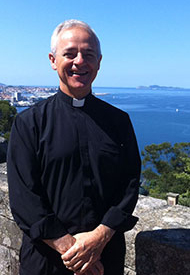News
LATEST NEWS AND EVENTS FROM THE SCHOOL OF ENGINEERING
San José's curriculum
Don Emilio Fuertes, chaplain of Tecnun, writes a article on the occasion of the feast of Saint Joseph

On March 19, we will celebrate in the Church the feast of St. Joseph, the father of Jesus. This unnoticed man, far from the circles of power and decision making of his time, was chosen by Divine Providence for the most important mission statement that no man has ever had: to be the father of Jesus of Nazareth.
If we think of the son, we will understand the greatness of the father's task. In the first century the father's task was decisive - even more than today - in the formation and Education of the sons, since there were no organized systems of Education for all, and the son inherited, almost without exception, the paternal profession. To this we must add the enormous authority that the patriarch had in Israel, as well as the paterfamilias in Rome. Joseph had to protect, to educate, to instruct in the work, in the life of Jesus, the Son of God.
What reasons were there for choosing him? What could he have put on his LinkedIn profile ? The truth is, his resume wouldn't be dazzling, but it wouldn't be blank either.
Saint Joseph belonged to the most illustrious family of Israel, the house and family of David, the most important king in the history of that people. He had professional experience in his work as a craftsman, carpenter, technician... Many authors are inclined to think that the term with which he is designated in the original texts (faber in Latin, τεχτων in Greek) is not so much a carpenter as a master builder, able to make furniture as a carpenter, or to fix a plow, or a yoke, but also to direct a small work. It is quite logical if we think that the population of Nazareth, in Galilee, where he lived and worked did not exceed 300 inhabitants, and that issue of potential customers is not enough for a job as a craftsman or carpenter.
Scripturists and archaeologists have thought that Joseph worked in the construction of the important city of Sepphoris, located about seven kilometers from Nazareth. Herod Antipas made it the most important city of Galilee, with several baths and some theater whose excavations have already been carried out. The works would require skilled workers from the surrounding area, and not just inexperienced labor. If this is so, and it is very plausible, Joseph, who would usually speak Aramaic, would also speak Greek (the English of Antiquity) to understand Herod's Roman engineers and architects, and Latin (Galilee was a province belonging to the Roman Empire, and the official language was Latin) in addition to Hebrew, language used for Jewish liturgical piety.
St. Joseph was a professional full of ingenuity, almost an engineer. In his task as the father of Jesus, he had to make difficult decisions and assume courageous and important responsibilities in a short time (such as going to Egypt) in a historical era where there was no legal security whatsoever.
With the little data we have we can get a fairly clear idea of the personality of this man.
We know that he was prudent, as is clear from the texts that tell us about him: he weighs the decisions he must take, he does not appear as a restless man, but serene in this pondering of the steps to take. We see him courageous, he knows the plans of the tyrant who seeks to kill his son, and he does not delay in setting out. He knows how to be versatile, to change a comfortable and known area for a different country -Egypt- where he must start from scratch. He prays deeply and trusts the voice of God, he is a man of faith.
Perhaps above all, however, two distinctive features stand out, both eloquent and both tremendously topical.
The first is surprising: we do not know a single word he has spoken. José is the man of silences. He acts with determination, but speaks little. He is put to test again and again in his life, but he trusts and not a single complaint escapes him. He faces complex projects, but does not spread them in order to give himself importance. He is a man of silence and deep thoughts. How much he needs silence at this time in our history! To weigh the plans, to succeed with the projects, to contemplate beauty, to listen to others...
The other trait I wish to highlight is nothing more than consequence. Joseph is faithful. He faces dangers and difficulties without doubting his mission statement. He is faithful to what is asked of him. He has nothing in common with that man described by none other than Gandalf in The Lord of the Rings: "Faithless is he who turns away when the way is darkened". Joseph is faithful in the midst of many moments of uncertainty, doubt and darkness. He is the quintessential faithful man.

